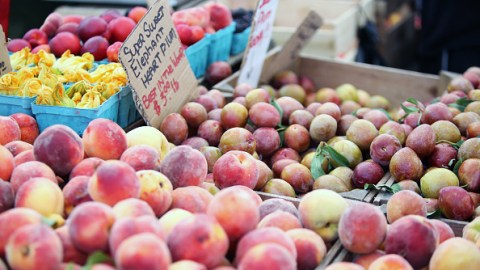Most Americans Can’t Define ‘Organic,’ So Why Are We Buying It?

If you’re a health-conscious grocery shopper, you may flock toward veggies that proudly display a sign reading, “Organic.” Perhaps you even take to purchasing products that market themselves as “all-natural” foods as well. But do you know what these words mean?
Sydney Brownstone of Fast Company writes on a recent study done by the brand consultancy, BFG. The team surveyed 300 shoppers (most under 35 years-old), and found 70% of those shopper bought organic, but only 20% believed they could pinpoint what “organic” meant. CEO of BFG, Kevin Meany, explained his team’s findings:
“What I think we’re seeing in grocery stores is that consumers are ultimately idealists. They desire honesty. They want to believe. They trust the label, and they’re willing to pay more based on that for something like ‘all-natural’ even though they’re not totally sure what it means.”
[C]onsumers are ultimately idealists. They desire honesty. They want to believe.
The FDA has no official definition for the term “organic,” however, the National Organic Program (NOP) defines, regulates, and provides certification for ingredients and products that have been produced and meet organic standards. But, even so, trying to get a detailed definition leads to vague summaries at best. The USDA defines “organic” as:
“…[an] agricultural product has been produced through approved methods that integrate cultural, biological, and mechanical practices that foster cycling of resources, promote ecological balance, and conserve biodiversity. Synthetic fertilizers, sewage sludge, irradiation, and genetic engineering may not be used.”
Kraft Singles, Brownstone points out, is cheese product—not real cheese—but the company is able to get away with advertising its food as “farm fresh.” Because of this misdirection, Meany believes that the “organic” revolution will die down and a shift in brand honesty will replace it: “Those brands that truly have a point of difference, if they can communicate that clearly and prove it to the consumer, they will have a distinct advantage.”
David Katz says we already know what a healthy diet is. Any confusion around that is driven by making money.
—
Natalie Shoemaker has been writing professionally for 6 years. After graduating from Ithaca College with a degree in Feature Writing, she snagged a job at PCMag.com where she had the opportunity to review all the latest consumer gadgets. Since then she has become a writer for hire, freelancing for various websites. In her spare time, you may find her riding her motorcycle, reading YA novels, hiking, or playing video games. Follow her on Twitter: @nat_schumaker
MANHATTAN, NEW YORK CITY, UNITED STATES – 2015/08/22: Large peaches and plums in bins. Union Square Park greenmarket is one of New York City’s largest and oldest, dating back to 1976. (Photo by Andy Katz/Pacific Press/LightRocket via Getty Images)





